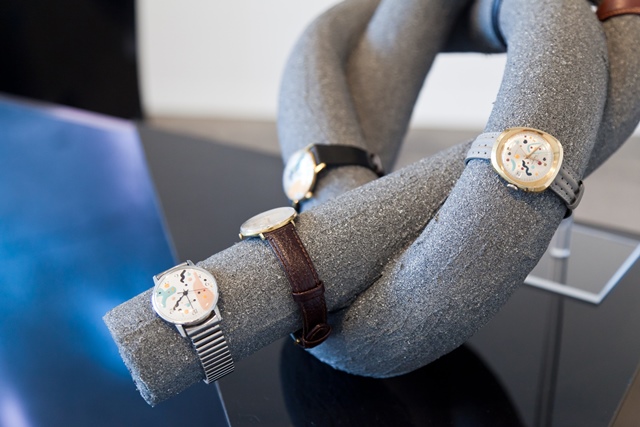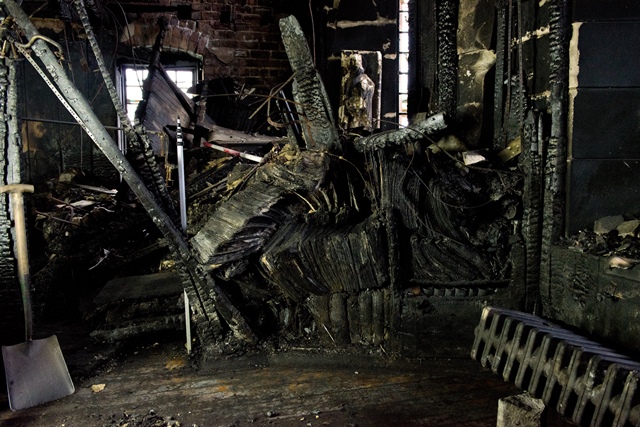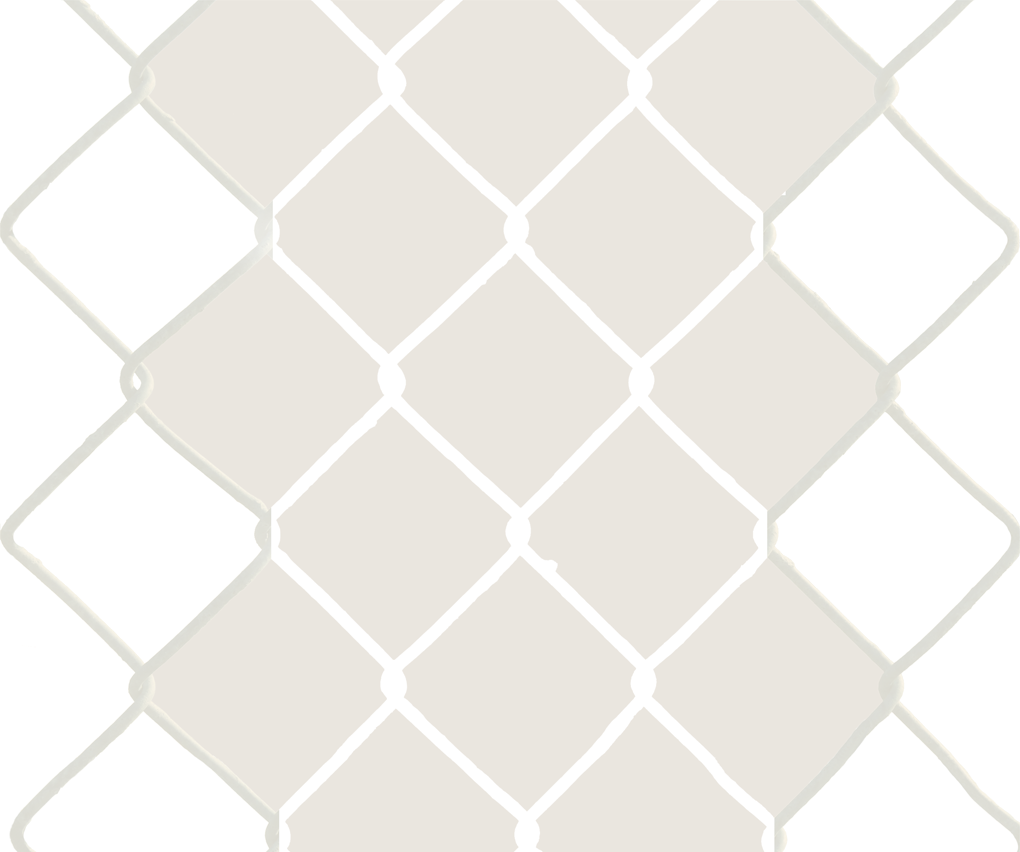OVER OVER OVER
July 11 - August 8, 2015
Simone DeSousa Gallery
Detroit, Michigan
Words people use to describe my mother: rousing, clever, gifted, elegant, insightful.
Iconic.
Some say she is a natural, born this way.
Maybe, too, she cultivates positive attributes to make amends.
Guilt can cripple, but, can also—depending on the individual—motivate.
My parents marry young, have me, perhaps, feel boxed in. Dad dies.
Abruptly.
Shot, mistakenly, by a hunter in the woods.
Mom is initially devastated.
Yet does not withdraw, lose interest in food, friends, appearance, me, the future. Within two years she remarries (Don, a childhood friend), they have a daughter (my half-sister Gina) and starts what will be a long, successful, recording career.
Motion as atonement. It is a plausible construct.
By initially devastated, I mean she screams, pulls her hair, smashes her guitar, punches and shatters the bathroom mirror, collapses on a hard, tile floor.
Dad dies at 24, Mom is 22, I am 4.
How do I learn things about her in that period?
Conversations, photographs, letters, journals, press coverage.
Eavesdropping.
Various memories and impressions.
Some, surely, distorted.
My thoughts on her emotional and professional state have nothing to do with her (now well-known) song melodies and lyrics. I never take artistic expression to be overtly autobiographical and you should not either. Creative constructions are fertile, hopefully safe, places to put, sometimes hide, things. The best “read” is not obvious.
In my opinion.
I learn things, losing a parent at 4 (latency stage, according to some schools of psychology).
One: true grief is never a waste. You just need to learn what to do with it.
Two: in general, people are less interested in how you feel than what you do. Therefore: channel, do not display, pain.
figure 1 |

|
John Nicol
Good Times Bad Times
photo courtesy of Cedric Tai |
----------------------
The other day, browsing in the stationary store (being particular about my pens, journals, paper, envelopes), I feel agitated, distracted, out of sorts and worry about why. I am in one of my favorite places, doing one of my favorite things and face no glaring work, family or friend problem. Sometimes, I feel a level of dis-ease before something bad—wait, is challenging a more productive term?—happens and prepare for facing Trouble. I work to mental focus. These words help:
I cannot control events, just my response to them.
I do not need to improve, just be-friend (maybe re-friend) who I am. Already.
After reciting the lines (silently), I move to breath exercises (short inhales --count to three-- and long exhales--count to eight). At the end of five sequences, I hear someone say,
A fictitious bid for a business can send its shares soaring.
Things fall into place in a way that diverts me from my unsettled mood. I think:
Phantom people, numbers, concepts can alter your concrete life. Consider: a fictitious lover makes your actual one wildly interested; an absent Dad is (can be?) a fictitious Dad and turned into a creep or a super hero.
I do not look to see the speaker because it would just distract me; I’d grow curious about them and miss out on the profundity of the statement.
We are all simply, separate, making our ways in, through, across, the universe. Thank You, Universe.
I love my stepfather, Don. I love my biological father, Dad. My relationships with them are so different. The stranger’s observation reminds me why.
Don I know, Dad I mostly make up.
Sometimes in ways that flatter, other times in ways that belittle. Him.
When I say I know Don, I don’t mean to say I REALLY know him (it is a tired but true conversation: how well can we know anyone, ever?). I mean, he is a physical presence in my life and there are things I can say about Don for sure:
His smell (soapy), his embrace (frequent, brief, soft), his laugh (deep) his drink (tea, milky). How he sits (cross legged) and on what (couch) when he reads the paper. His feet (broad, calloused, high arched). His morning routine: rowing (outside through the river in good weather, on his indoor machine in bad), his blue Adidas exercise pants, his bookshelf (historical non-fiction). His breakfast: cold cereal during the week; eggs with some kind of meat on weekends. His hobbies (fishing, music, watching professional sports). He plays drums, sometimes professionally (not with Mom).
I know he enjoys, well, loves, Gina and me; takes us to aquariums, museums, baseball and basketball games when Mom tours, holds recording sessions or requires alone time.
So that’s Don. Dad, in contrast, lives mostly in my imagination. I base “him” on memory fragments, assorted snapshots, a few home movies and recollections by others. That part gets complicated. What people say about Dad, as you can imagine, becomes more graphic as I get older. I have some facts about him and play and replay versions of them in my head. Handsome, stocky, blond. Likes tinkering with motor bikes, clocks; enjoys beer, cars, people. But who is to say what he might have grown into? So I start to write stories about what he might have been, maybe, even, be. In another world, register, plane, universe.
My first Dad story: he is a phantom. A famous former baseball player (ace pitcher) who disappears from earth but becomes a spirit and functions as a good detective, protecting people in the town, starting with a young girl, Bea, a potential star pitcher herself. I might share it (entirely) later, but, right now, I fear it is a little boring and I want you to like, at least be interested in, me.
Incidentally, in my head, Dad starts as a ghost on the way to becoming a spirit. A ghost is not finished (with something), so does not have the ability to travel between registers. A spirit is further transitioned and can come and go between different zones. In my mind, anyway. I am not sure every expert on the subject would agree but I am just learning.
Brief plot summary:
Dad (Coach Tom) saves the life of, and solves, a brutal crime against nine-year-old Bea, a gifted softball pitcher. She goes onto become one of the greatest pitchers of all time. Helped by Coach Tom—heroic, professional, athletic, humble, strategic—always gently, firmly in her arena.
figure 2 |

|
Rosie O'Grady
Hygrothermograph
photo courtesy of Cedric Tai |
-----------------------------------
For a while, I blame myself when Dad is killed. It is one of those feelings that hangs around. I try to push it out or under something but it never leaves, just hovers with varying degrees of damp, weight and proximity.
I do not know if this scene really happened—how could I at age 4? Is it a dream, a wish, an actual event?
It has to do with a doctor kit someone gifts me. Me asking Dad to play doctor. Asking him to take my temperature, pulse, measure and record my height, weight. Time my heartbeat with a stethoscope pressed lightly on my chest, hand on my forehead. He follows instructions. Presses his thumb and forefinger beneath my chin, down my throat to check for lumps. When he does this I take his hand, direct it to my lower stomach suggesting, in my mind he check between my legs, hoping he might press there. He responds with what I sense as alarm. I sense my move disturbs him. Deeply. He frowns, moves away. Quickly. First to the end of the couch, then into the kitchen. I stay sprawled on the couch, holding the stethoscope, looking down at the black doctor bag with its tape measure, tongue depressor and arm band open on the floor.
That may not be exactly what happens but in my mind: I over-step a boundary and irritate him. I ask for something I should not have asked for. I feel shame because of that urge (it was so strong!); self-loathing for wanting Dad to just press his hand. There.
The next day he leaves for his planned weekend trip to the woods and is shot by a hunter who mistakes him for an animal. It is hunting season but Dad does not wear the protective orange to signal he is human, not legally hunt-able.
Now, looking back, I wonder how I, as an adult, would handle this game with the doctor kit; what would I do, have done, in Dad’s place.
Hopefully, respond to the border testing in a firm, loving, way. Touch the child appropriately (palm on the head, or, firmly grip both shoulders) and say something like, “Adults never touch children between their legs. Except doctors. In an office. With one or both of your parents in the room.”
I would use it as a moment: firm, gentle, teach-able; emphasize that it is not bad to want, and to express what you want. That means you push borders and pushing borders can be the best thing you do in your life. But some borders should stay put. In this case, your Dad protects you by just saying no.
This should help you to feel happy, safe, protected, not bad. Do not let imagining you did something wrong prevent you from wanting, wishing, dreaming your future. Stay bold.
I would want to communicate these kinds of thing.
But how to do the further work? How to disconnect the doctor kit interaction with the murder? Thinking more and more about this, I decide I would get advice from a psychological-spiritual professional rather than muddle through on my own.
figure 3 |

|
Francis McKee
Mackintosh Building, Glasgow School of Art, 2014-15
photo courtesy of the artist |
*Curated by Cedric Tai,
Glasgow based artists:
Tessa Lynch
Francis McKee
John Nicol
Rosie O’Grady
Ross Sinclair
|








